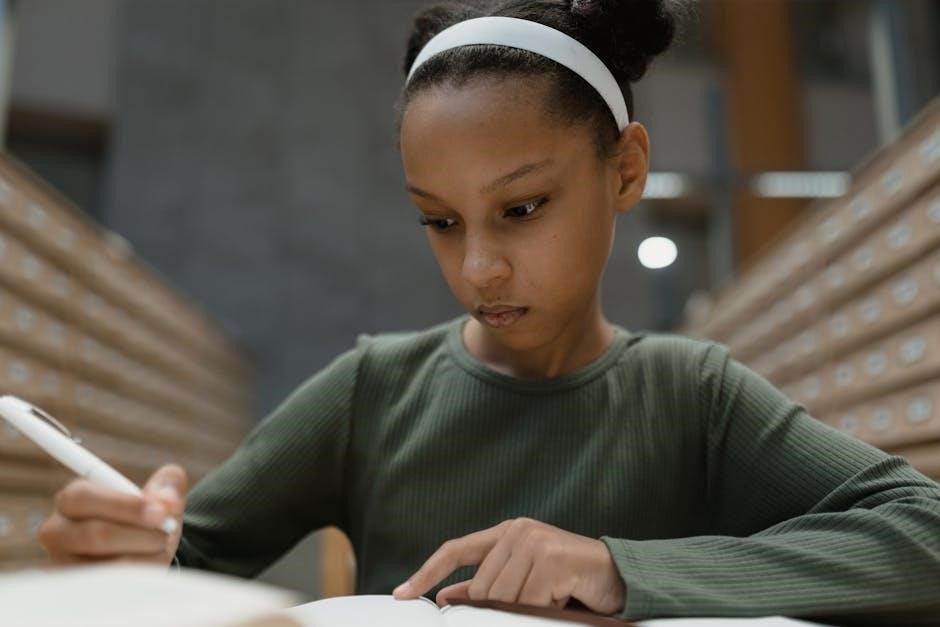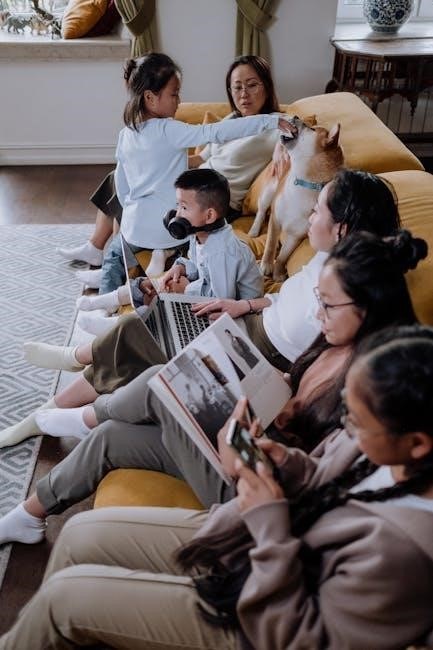
7 habits highly effective teens pdf
This popular guide by Sean Covey offers practical advice for teens to develop essential life skills, fostering personal growth and effectiveness in daily life.
Overview of the Book and Its Importance
Sean Covey’s The 7 Habits of Highly Effective Teens is a transformative guide tailored for adolescents, offering practical advice to navigate life’s challenges. The book adapts Stephen Covey’s renowned principles for a younger audience, focusing on self-improvement and personal effectiveness. Its relatable examples and real-world applications make it a valuable resource for teens seeking to build confidence, improve relationships, and achieve their goals. By fostering essential life skills, the book empowers teenagers to thrive during their formative years and beyond.
Why These Habits Matter for Teenagers
Adopting these habits equips teens with timeless life skills, helping them navigate adolescence with confidence and purpose. By fostering proactivity, goal-setting, and effective communication, the habits empower teens to build strong relationships, manage time wisely, and cultivate a win-win mindset. These principles are crucial during formative years, enabling young individuals to make informed decisions, embrace diversity, and prioritize self-care. Mastering these habits lays a solid foundation for personal growth, academic success, and future achievements, guiding teens toward becoming their best selves.
Habit 1: Be Proactive
Being proactive means taking responsibility for choices and reactions, empowering teens to focus on what they can control, rather than blaming circumstances.
Understanding Proactivity
Proactivity is about taking initiative and responsibility for one’s choices and actions. It involves focusing on what you can control, rather than reacting to circumstances. This mindset helps teens recognize their influence over their lives, fostering a sense of accountability and empowerment. By being proactive, they learn to prioritize intentional decisions over passive reactions, creating a foundation for personal growth and effectiveness in daily life. It’s a crucial step in developing self-awareness and leadership skills.
How Teens Can Apply Proactivity in Daily Life
Teens can apply proactivity by taking ownership of their choices and actions. This includes setting personal goals, solving problems without being prompted, and speaking up when necessary. Proactive teens anticipate challenges and prepare for them, rather than waiting to react. They also focus on improving their relationships by initiating positive interactions; By adopting this mindset, teens can gain confidence, build resilience, and create opportunities for success in school, social settings, and beyond. It encourages a growth mindset and self-accountability, leading to personal growth and effectiveness.
Habit 2: Begin with the End in Mind
This habit encourages teens to set clear, long-term goals and visualize their future, helping them prioritize decisions that align with their personal values and aspirations.
Setting Long-Term Goals
Setting long-term goals helps teens envision their future and create a roadmap for success. By aligning these goals with personal values and priorities, they gain clarity and purpose. This habit encourages teens to think critically about what they want to achieve in areas like education, relationships, or personal growth. Writing down these goals makes them tangible and serves as a constant reminder of what they strive for. Regularly reviewing and adjusting goals ensures they remain relevant and achievable, fostering a sense of direction and focus. This process builds confidence and helps teens stay committed to their aspirations, even when challenges arise.
Creating a Personal Mission Statement
A personal mission statement is a powerful tool that helps teens clarify their values, beliefs, and aspirations. It serves as a guiding compass, influencing decisions and actions. By crafting a meaningful statement, teens can define who they are, what they stand for, and what they hope to achieve. This process encourages self-reflection and helps identify long-term goals. A well-written mission statement should be concise, yet impactful, reflecting core beliefs and serving as a reminder of one’s purpose. Regularly reviewing and updating it allows teens to track their growth and stay aligned with their values.

Habit 3: Put First Things First
Habit 3 focuses on effective time management, teaching teens to prioritize tasks based on importance and urgency. This habit helps reduce stress and boost productivity.
Time Management for Teens
Effective time management is crucial for balancing school, extracurricular activities, and personal life. Teens can prioritize tasks using tools like planners or digital apps, focusing on what’s most important. By learning to delegate and avoid procrastination, they can achieve their goals without feeling overwhelmed. Establishing a daily routine and setting realistic deadlines help maintain consistency. This habit encourages teens to value their time, leading to increased productivity and reduced stress, ultimately helping them succeed in both academics and personal growth.
Using the Eisenhower Matrix
The Eisenhower Matrix is a powerful tool for prioritizing tasks. It categorizes activities into four quadrants: urgent and important, important but not urgent, urgent but not important, and neither. Teens can use this matrix to focus on what truly matters, delegate or eliminate less important tasks, and schedule others. This approach helps in managing time effectively, reducing stress, and achieving long-term goals by concentrating on high-impact activities. It’s a simple yet effective way to enhance productivity and decision-making skills.

Habit 4: Think Win-Win
Win-win thinking emphasizes valuing mutual success, fostering positive relationships, and seeking solutions where everyone benefits. This mindset promotes collaboration, trust, and long-term success in personal and professional interactions.
Building Positive Relationships
Building positive relationships is central to the win-win habit, fostering trust, empathy, and mutual respect. Teens learn to value others’ perspectives, creating strong connections. Effective communication and collaboration are key. By focusing on mutual benefit, teens build lasting friendships and professional networks. This approach helps them navigate conflicts and achieve shared goals. Positive relationships not only enhance personal growth but also create a supportive environment for success in school, extracurricular activities, and beyond. This mindset is essential for long-term personal and professional fulfillment.
How to Foster a Win-Win Mindset
Fostering a win-win mindset involves seeking solutions where everyone benefits. Teens can practice this by listening actively, valuing others’ perspectives, and collaborating to find mutually beneficial outcomes. Empathy and cooperation are key. Encouraging open communication helps build trust and strengthens relationships. By focusing on shared success, teens can create positive experiences and long-term connections. This mindset not only resolves conflicts but also enhances personal and collective growth, making it a powerful tool for achieving success in all areas of life.
Habit 5: Seek First to Understand, Then to Be Understood
This habit emphasizes empathy and active listening. Teens learn to truly understand others’ perspectives before expressing their own, fostering deeper connections and effective communication.
The Importance of Active Listening
Active listening is crucial for building strong relationships and understanding others. It involves fully focusing on the speaker, avoiding interruptions, and showing empathy. By truly hearing others, teens can gain insights, resolve conflicts, and foster trust. This skill helps in clarifying misunderstandings and strengthens communication. Practicing active listening demonstrates respect and openness, key elements for effective interactions. It’s a powerful way to connect deeply with others and grow personally.
Effective Communication Skills for Teens
Effective communication is vital for teens to express themselves clearly and build meaningful connections. It involves both verbal and non-verbal elements, such as maintaining eye contact and using open body language. Teens should practice articulating their thoughts confidently while being approachable. Active listening combined with clear expression helps avoid misunderstandings and fosters mutual understanding. Developing these skills empowers teens to navigate social and academic challenges with confidence, leading to stronger relationships and personal growth.

Habit 6: Synergize
Synergy is about valuing diversity and collaboration to achieve more together than individually. It enhances creativity, productivity, and problem-solving by combining unique perspectives and strengths.
Working Together to Achieve More
Synergy emphasizes the power of teamwork and collaboration. By combining diverse perspectives and skills, individuals can achieve far more together than alone. This habit encourages teens to embrace teamwork, fostering creativity and problem-solving. When people collaborate effectively, they unlock new ideas and approaches that individual efforts might miss. Synergy is not just about numbers; it’s about how well team members align their strengths to reach a common goal. This mindset helps teens understand that collective effort often leads to greater success in school, sports, or any group project.
Valuing Diversity and Collaboration
Valuing diversity and collaboration means recognizing the strength in differences and leveraging them to achieve better outcomes. By embracing diverse perspectives, teens can gain deeper insights and develop innovative solutions. Collaboration fosters mutual respect, inclusivity, and shared goals, leading to stronger relationships and teamwork. This habit encourages teens to appreciate others’ unique qualities, creating a supportive environment where everyone feels valued. When diversity is celebrated, it enhances creativity and problem-solving, helping teens succeed in both academic and social settings.
Habit 7: Sharpen the Saw
Habit 7 focuses on self-care, emphasizing the importance of renewing physical, social, mental, and spiritual health to maintain effectiveness and well-being regularly.
Self-Care for Teens
Self-care is a priority for teens, emphasizing balance in physical, social, mental, and spiritual well-being. Neglecting these areas can lead to burnout and decreased effectiveness. By practicing self-care, teens can recharge and maintain energy levels, ensuring they are prepared to tackle daily challenges. This includes activities like exercise, healthy eating, meaningful social interactions, and mindfulness practices. Regular self-care fosters resilience and helps teens sustain their personal growth and effectiveness in all areas of life, aligning with the principles of Habit 7.
Physical, Social, Mental, and Spiritual Health
Physical health involves regular exercise and healthy eating to maintain energy and vitality. Social health is built through positive relationships and effective communication. Mental health requires mindfulness and stress management to stay focused. Spiritual health involves connecting with personal values and purpose, providing inner peace and direction. Balancing these four dimensions ensures holistic well-being, enabling teens to cultivate habits that promote long-term effectiveness and happiness in their lives, as emphasized in the 7 Habits framework.

Putting It All Together
Integrating the 7 habits into daily life helps teens achieve balance and effectiveness, fostering personal growth and success in various aspects of their lives consistently.
Benefits of Practicing the 7 Habits
Practicing the 7 habits fosters personal growth, improves time management, and enhances relationships. Teens develop self-awareness, resilience, and a proactive mindset, leading to better academic and social outcomes. By prioritizing goals and embracing collaboration, they cultivate a balanced lifestyle. These habits empower teens to navigate challenges confidently, building a strong foundation for long-term success and happiness in all areas of life.
How to Implement the Habits in Real Life
Start by identifying one habit to focus on at a time. Practice it consistently, reflecting daily on progress. Use tools like a planner or app to track goals and tasks. Engage in activities that align with each habit, such as creating a mission statement or using the Eisenhower Matrix for time management. Surround yourself with supportive people and celebrate small wins to stay motivated and build confidence in applying the habits effectively;
Final Thoughts on the 7 Habits
Sean Covey’s 7 Habits provide timeless wisdom for teenagers seeking self-improvement. These principles encourage proactive behavior, goal-setting, and effective communication, empowering teens to navigate life’s challenges with confidence. By embracing these habits, young individuals can cultivate a strong foundation for personal and professional success. The guide’s practical advice makes it an invaluable resource for teens aiming to enhance their lives and achieve their full potential. Start your journey today and unlock a more effective, fulfilling tomorrow.
Encouragement for Teens to Start Their Journey
Embracing the 7 Habits is a powerful step toward personal growth and effectiveness. Teens are encouraged to take initiative by applying these principles daily. Start with small changes, like being proactive or setting clear goals, and gradually build lasting habits. Remember, success is a journey, not a destination. By committing to these practices, teens can unlock their potential, overcome challenges, and create a brighter future. Take the first step today and begin your transformative journey toward becoming highly effective.
Leave a Reply
You must be logged in to post a comment.